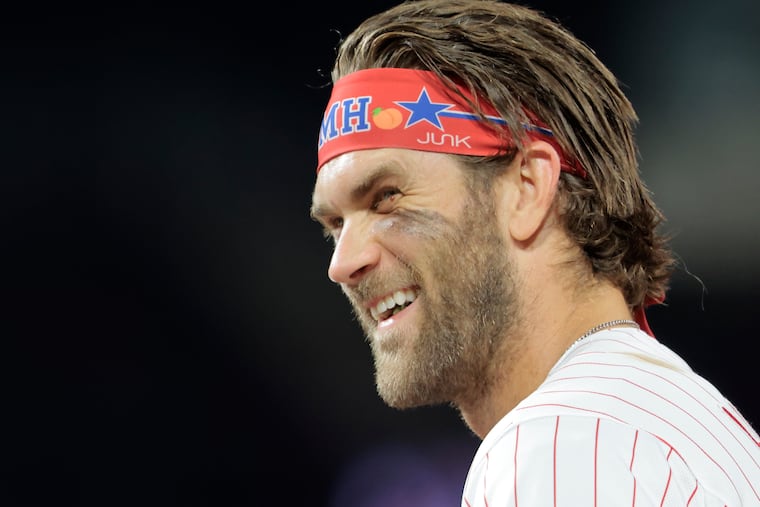Bryce Harper was the NL MVP, but does his season rank among the ‘most valuable’ in Philly sports history? | Mike Sielski
What defines an MVP is often in the eye of the beholder. But these four athletes had seasons that, in the context of their eras, were pretty incredible.

When the Baseball Writers of America voted Bryce Harper the 2021 National League Most Valuable Player, it marked the eighth time a Phillies player had won the award. Harper’s achievement was also distinguished by its lack of controversy and confusion – both in the moment and in hindsight – relative to his predecessors.
In 2007, Jimmy Rollins declared the Phillies the “team to beat” in the NL East, then backed it up with a great season – an enticing storyline that persuaded enough writers to look past Matt Holliday’s superior statistical performance for the Rockies. In 2006, Ryan Howard led the NL in home runs and RBIs for a team that won 85 games and missed the playoffs. He won the award. But the Cardinals’ Albert Pujols led the NL in slugging percentage, OPS, and WAR – and had a batting average 18 points higher than Howard’s – for a team that won 83 games and made the playoffs. Flip a coin there.
Of course, neither of those situations compares with the puzzling choice of Jim Konstanty in 1950. The closer for the “Whiz Kids,” Konstanty saved 22 games, won 16 more, and had an excellent 1.039 WHIP. But there were at least three members of his own team (Robin Roberts, Andy Seminick, and Del Ennis) who were more deserving candidates, not to mention the Dodgers’ Jackie Robinson and Duke Snider.
» READ MORE: Bryce Harper, $330M man and NL MVP, has been worth every penny to the Phillies | Marcus Hayes
But none of those seasons – not Harper’s, not Rollins’, not Howard’s, not Konstanty’s, not the three in which Mike Schmidt won the award, not the one in which Chuck Klein did – would qualify as the “most valuable” that a Phillies player ever had. None of them would come all that close. In fact, if you were to pick an all-time “most valuable player” for each of the four big pro sports in this town, the best single seasons in the histories of the Eagles, Phillies, Sixers, and Flyers, the performances that contributed most to a team’s success, I’d submit your choices would be pretty easy.
Football: Norm Van Brocklin, Eagles, 1960
Look, young’uns. You can roll your eyes if you want to. You can point out that football is a different sport, played by bigger and better athletes, now than it was then. And you can complain that Van Brocklin’s season is irrelevant because it violates the sacrosanct rule of It Happened So Long Ago That It Doesn’t Count. Go ahead. I’ll still be right.
One can judge a man only in the context of his time, and by that measure, Van Brocklin’s season established a standard that Eagles quarterbacks have been trying to meet ever since. The Eagles went 10-2 and won the NFL championship. Van Brocklin led the league in fourth-quarter comebacks (five) and game-winning drives (four), and he was second in the league in passing yards (2,471), touchdowns (24), yards per attempt (8.7), and passer rating (86.5). There were four entities that handed out MVP awards then: the Associated Press, United Press International, the Jim Thorpe Trophy, and the Joe F. Carr Trophy. Van Brocklin was the second player to win all four. Jim Brown was the first.
Hockey: Bernie Parent, Flyers, 1973-74
Those Flyers teams of the mid-1970s were the big, bad Broad Street Bullies, of course. And they had an underappreciated amount of offensive skill in Bobby Clarke, Bill Barber, Rick MacLeish, and Reggie Leach. But Parent was their one indispensable player, and he was never better than in ‘73-74. In leading the franchise to its first Stanley Cup, Parent led the NHL in 11 traditional and analytical regular-season categories, including games (73), wins (47), goals-against average (1.89), and shutouts (12), and he was every bit as good in the playoffs. His save percentage that season was .932, a figure that no goaltender matched for the subsequent quarter-century.
Basketball: Wilt Chamberlain, Warriors, 1961-62
The ‘61-62 Warriors went 49-31 and lost to Bill Russell, Bob Cousy, and the Celtics in the Eastern Division finals, but Chamberlain’s dominance remains remarkable to contemplate more than a half century later. It’s not just that he scored 100 points in one game. Or that he averaged 50.4 points and 25.7 rebounds a game. Or that he led the NBA in wins shares that season with 23.11, the fourth-highest total in league history. It’s that he averaged more than 48 minutes a game that season, because he played every minute of every game, even the ones that went into overtime.
Baseball: Steve Carlton, Phillies, 1972
Next year will mark the 50th anniversary of what is certainly the greatest season of any Phillies pitcher and, given the quality of the team around Carlton, arguably of any pitcher ever. To the most devoted Phillies followers, Carlton’s numbers that season are unforgettable: a 27-10 record, a 1.98 ERA, 310 strikeouts in 346 innings, 30 complete games in 41 starts, all for a club that went 59-97. But his excellence that season deserves another layer of context.
No major-league franchise has lost more games in its existence than the Phillies, and just four have lower all-time winning percentages. But that 1972 team remains the worst Phillies club of the last 62 years. Its winning percentage was .378, and it was that bad even though the team had a 29-12 record in the games Carlton started. Without him, the ‘72 Phillies were 30-85, for a winning percentage of .260, which would have made them the sixth-worst team in modern major-league history.